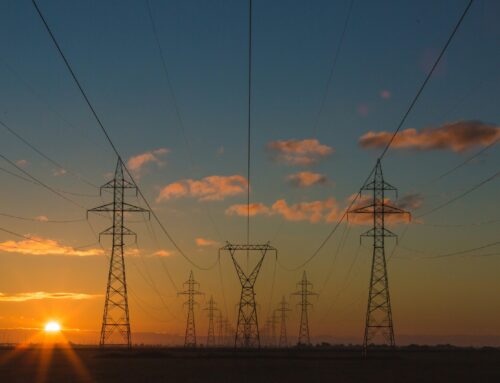Where do NJ’s Jack Ciattarelli and President Trump disagree? Solar energy.
October 21, 2025
Jack Ciattarelli has a vision.
The Republican nominee for New Jersey governor has talked often on the campaign trail about installing solar panels on the rooftops of warehouses that blanket much of the state — part of his pitch to voters for lowering skyrocketing electricity bills.
But many solar industry experts say his plan is at odds with his most consequential political backer: Donald Trump. The president has cancelled large solar projects and eviscerated federal subsidies that eased the expense of installing solar arrays, driving up the cost of Ciattarelli’s proposal if he’s elected in November.
“Supporting the Trump administration’s clean energy policies while saying you support solar is watering weeds and expecting flowers,” said Elowyn Corby, the Mid-Atlantic Regional Director for advocacy nonprofit Vote Solar.
Energy costs are a top concern among New Jersey voters, according to polling. Electricity bills in the state jumped 20% in June and more spikes are expected as demand for more power in the region outstrips supply.
Both Ciattarelli and his Democratic opponent, Mikie Sherrill, say they’ll open up energy production and capacity – including renewable energy like solar and battery storage – in the state. In 2022, NJ’s last two coal plants were shut down to lower emissions. They are now being converted to battery storage facilities.
Unlike some Republicans, Ciattarelli has been willing to acknowledge the effects of climate change.
“ Mother Earth is sending us some powerful signals. I think human activity has a lot to do with that, but we need a rational transition to the future with regard to our energy,” Ciattarelli said during the first gubernatorial debate this fall. “Natural gas is a rational transition to the future, as is nuclear energy down in South Jersey, as is solar. We need an all-of-the-above approach.”
But Trump has made the transition to solar more difficult. Earlier this month, the administration canceled what would have been the country’s largest solar installation project — built in Nevada — which would have produced enough energy to power two million homes.
And Trump’s Big Beautiful Bill, signed into law earlier this year, gutted federal tax incentives that solar companies and consumers have relied on to make installation affordable.
“It’s a full frontal attack on solar energy,” said Lyle Rawlings, president and CEO of New Jersey-based commercial solar installation firm Advanced Solar Products. “So that would be very much in conflict with New Jersey policies to encourage and develop solar.”
The federal government has also canceled community solar grants that were already awarded and moved to claw back the funds, Rawlings said, adding that new tariffs on solar panels manufactured outside the country have “tightened the noose” on solar companies, some of which have been forced to declare bankruptcy.
Many energy experts have said Trump’s energy policies will only lead to more price hikes for consumers.
While Sherrill has criticized Trump’s stance on energy and made fighting back against his policies a centerpiece of her campaign, Ciattarelli has continued to support the president. He gave Trump an “A” on his job performance and said the president is “right about everything that he’s doing.”
The Republican nominee was also unwilling to criticize Trump for freezing funding for the Gateway tunnel project, a vital link between New Jersey and New York that tens of the thousands of New Jersey commuters will depend on if it’s ever completed.
Ciattarelli’s campaign didn’t respond to a request for comment on how his solar policies differ from the president’s.
Ciattarelli has been more willing to criticize the current governor, Phil Murphy, claiming he did not do enough to expand solar during his eight years in office. But according to Murphy’s office, the state has increased its solar capacity from 2.4 gigawatts to 5.2 gigawatts during his time as governor, with solar currently producing enough energy to power over 600,000 homes.
Evan Vaughn, executive director for the Mid-Atlantic Renewable Energy Coalition, said the state’s Clean Energy Act, which Murphy signed into law in 2018, “set the stage for the growth of solar.”
“Gov. Murphy has supported solar energy. New Jersey has a strong existing solar energy capacity. There’s more planned,” Vaughn said.
Murphy signed a new law in August expanding the state’s community solar program by 50%.
Sherrill has also supported expansion of the program — specifically on the roofs of warehouses. And she’s proposed creating solar fields on landfills, brownfields, parking lots, and quarries around the state.
But the Democratic candidate has faced criticism too. The centerpiece of her proposals to lower consumer energy costs is a pledge to declare a state of emergency and freeze energy rates on day one in office. But even her own Democratic ally, Gov. Phil Murphy, has questioned whether the governor has that power.
“I’m not sure how you’d actually do that,” Murphy told reporters in August, according to the New Jersey Globe.
Solar industry proponents said they appreciate Ciattarelli’s embrace of solar and hope to work with whoever is elected on further expansion.
Corby, from the advocacy nonprofit Vote Solar, said Ciattarelli’s support for solar reflected a “growing” and nonpartisan understanding that solar can lower utility bills if given enough support
Search
RECENT PRESS RELEASES
Related Post



